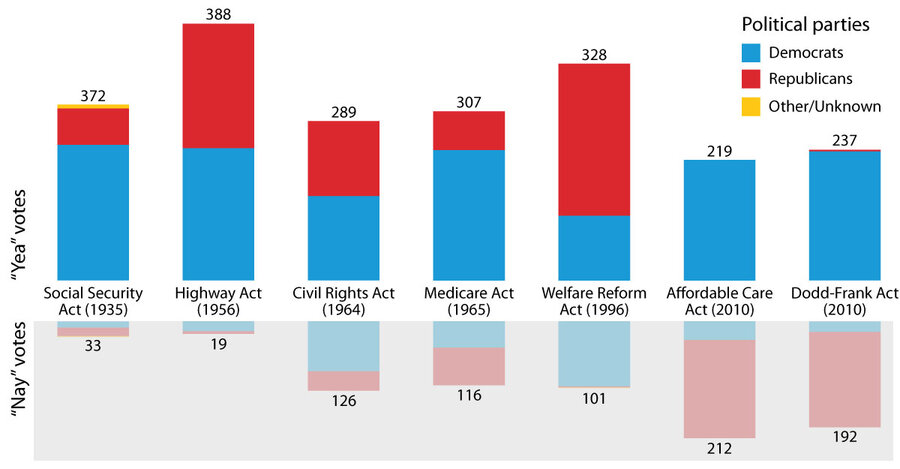The Trump administration has been signaling that the United States should be pulling back from alliances and treaties. Some call this an abdication of the US leadership role. But the White House maintains the US can still lead while running a leaner, more efficient foreign-policy operation.

Why is ���Ǵ��� Science in our name?
Our name is about honesty. The Monitor is owned by The First Church of Christ, Scientist, and we’ve always been transparent about that.
The church publishes the Monitor because it sees good journalism as vital to progress in the world. Since 1908, we’ve aimed “to injure no man, but to bless all mankind,” as our founder, Mary Baker Eddy, put it.
Here, you’ll find award-winning journalism not driven by commercial influences – a news organization that takes seriously its mission to uplift the world by seeking solutions and finding reasons for credible hope.
Explore values journalism About usAlready a subscriber? Log in
Already have a subscription? Activate it
Ready for constructive world news?
Join the Monitor community.
SubscribeMonitor Daily Podcast
- Follow us:
 Marjorie Kehe
Marjorie Kehe
In the five years that I worked as an education reporter for the Monitor, I learned to be very cautious about good news. It was too easy to write a story about a promising new charter school or a school system’s improved test scores only to be disappointed mere months later by a reversal.
And yet this month I’m allowing myself to feel rather hopeful about public schools in Newark, N.J. Test scores are up, graduation rates are up, and, as of this school year, the schools will be back in the hands of the city – after more than 20 years under state control. At the same time, Newark Mayor Ras Baraka (a former school principal) and school superintendent Christopher Cerf seem to have forged a respectful and productive alliance.
Journalist Dale Russakoff wrote about Newark schools in her 2015 book “The Prize.” To fix a system as large and troubled as the Newark schools, Ms. Russakoff said once in an interview, it’s not a matter of “a big idea and new thing.” Instead, she said, “It’s something that you have just to do slowly and patiently and often tediously.”
Let’s hope that’s what we’re seeing in Newark today.
Now, our five stories for your Monday.
Already a subscriber? Log in
Help fund Monitor journalism for $11/ month
Monitor journalism changes lives because we open that too-small box that most people think they live in. We believe news can and should expand a sense of identity and possibility beyond narrow conventional expectations.
Our work isn't possible without your support.
Today’s stories
And why we wrote them
( 6 min. read )

( 8 min. read )
Typically, when a natural disaster hits, Americans with more resources bounce back faster. Will post-Harvey Houston find a way to manage a more equitable recovery?
( 5 min. read )
What happened to South Sudan's "Freedom Bridge"? Announced five years ago, it was intended to reach across the Nile and improve the infant country's economic connections to Kenya and Uganda. But then things got complicated.

( 6 min. read )
Why are environmental issues so often associated with a liberal worldview? Humans aren’t born Republicans and environmentalists, notes a conservative environmentalist. Rather, they become both of these things after witnessing waste.
( 4 min. read )
Is change really possible in Washington? Two authors have some ideas. A lot depends, they say, on the model you start with.
The Monitor's View
( 2 min. read )
Ten years after Apple made the smartphone “cool,” it wants to turn its retail stores into something warm. It announced last week that the nearly 500 Apple Stores will no longer really be stores but “town squares.” In the era of social everything, Apple’s glass-and-white-walled boxes are to become gathering places. People will be invited to “relax, meet up with friends, or just listen to a local artist on the weekends.”
If that sounds a lot like your local mall, Starbucks, or even McDonald’s – commercial places designed to be social spaces – Apple’s idea goes further. It wants to attract “influencers,” or thinkers and leaders who can create new connections or spark new ideas. The “genius bar” will become a “genius grove,” with plants that might promote friendliness. Courses such as photography will be offered in “forums.” Children can attend a “kids hour” on Saturdays. Apple products will be sold in “avenues.” Local entrepreneurs can use rooms to work. The open spaces will be “plazas,” suitable for concerts or lectures.
Apple is hardly the first American tech firm to encourage and satisfy people’s desire for a sense of belonging, either in cyberspace or physical space. Google claims it offers “a rich experience for community conversations.” Airbnb encourages guests to join common activities, or “experiences.” The world’s greatest connector, however, may be Facebook, with more than a billion users. It claims to “make it easy to coordinate with friends near and far.”
As French writer Alexis de Tocqueville noted in the 19th century, “Americans of all ages, all conditions, and all dispositions constantly form associations.” And that is why the US Constitution protects the right of peaceable assembly. The Digital Age isn’t just about hardware, software, or “the internet of things.” It can also be an “internet of community,” or what Wired magazine described in 2005 as an “electricity of participation.”
The biggest gap between countries today, says Klaus Schwab, founder of the World Economic Forum, isn’t as much about the disparity of wealth as it is about those who are connected and those who aren’t. According to a new report by the United Nations-backed Broadband Commission for Sustainable Development, 52 percent of the world’s population still do not have internet access. Most of those people are in Asia and Africa. Yet, in a sign of how people can leapfrog old technology, two-thirds of people do have access to mobile phones – more than those who have electricity at home, a bank account, or running water. People crave the bonds of community as much as their worldly needs.
The Digital Age comes with many problems, writes Mr. Schwab in a new book, “The Fourth Industrial Revolution.” But it can also “lift humanity into a new collective and moral consciousness based on a sense of shared destiny. The choice is ours.”
Apple’s ‘town squares’ may be only one of many shared places to come up with that shared destiny.
A ���Ǵ��� Science Perspective
Each weekday, the Monitor includes one clearly labeled religious article offering spiritual insight on contemporary issues, including the news. The publication – in its various forms – is produced for anyone who cares about the progress of the human endeavor around the world and seeks news reported with compassion, intelligence, and an essentially constructive lens. For many, that caring has religious roots. For many, it does not. The Monitor has always embraced both audiences. The Monitor is owned by a church – The First Church of Christ, Scientist, in Boston – whose founder was concerned with both the state of the world and the quality of available news.
( 3 min. read )
News of youths disconnected from affordable education and gainful employment has urged people to pray for their well-being and to challenge predictions that they are at greater risk for poverty and long-term unemployment. As one writer confides, “What brought me hope, direction, and security were the spiritual lessons I was learning from the Bible,” which showed him to put God first in his life. It was in practicing lessons from Jesus’ Sermon on the Mount that he found ways to stay in school and find job opportunities in unexpected ways. His example shows what’s possible for youths today. Prayer that seeks God’s goodness challenges statistics, resulting in practical provision.
A message of love

A look ahead
Thanks for reading! Come back tomorrow. One of the stories we hope to have ready: Russia is in the midst of its largest military games since the cold war, ruffling feathers in European states bordering Vladimir Putin’s Russia. What does this signal about Moscow’s own threat perceptions?








